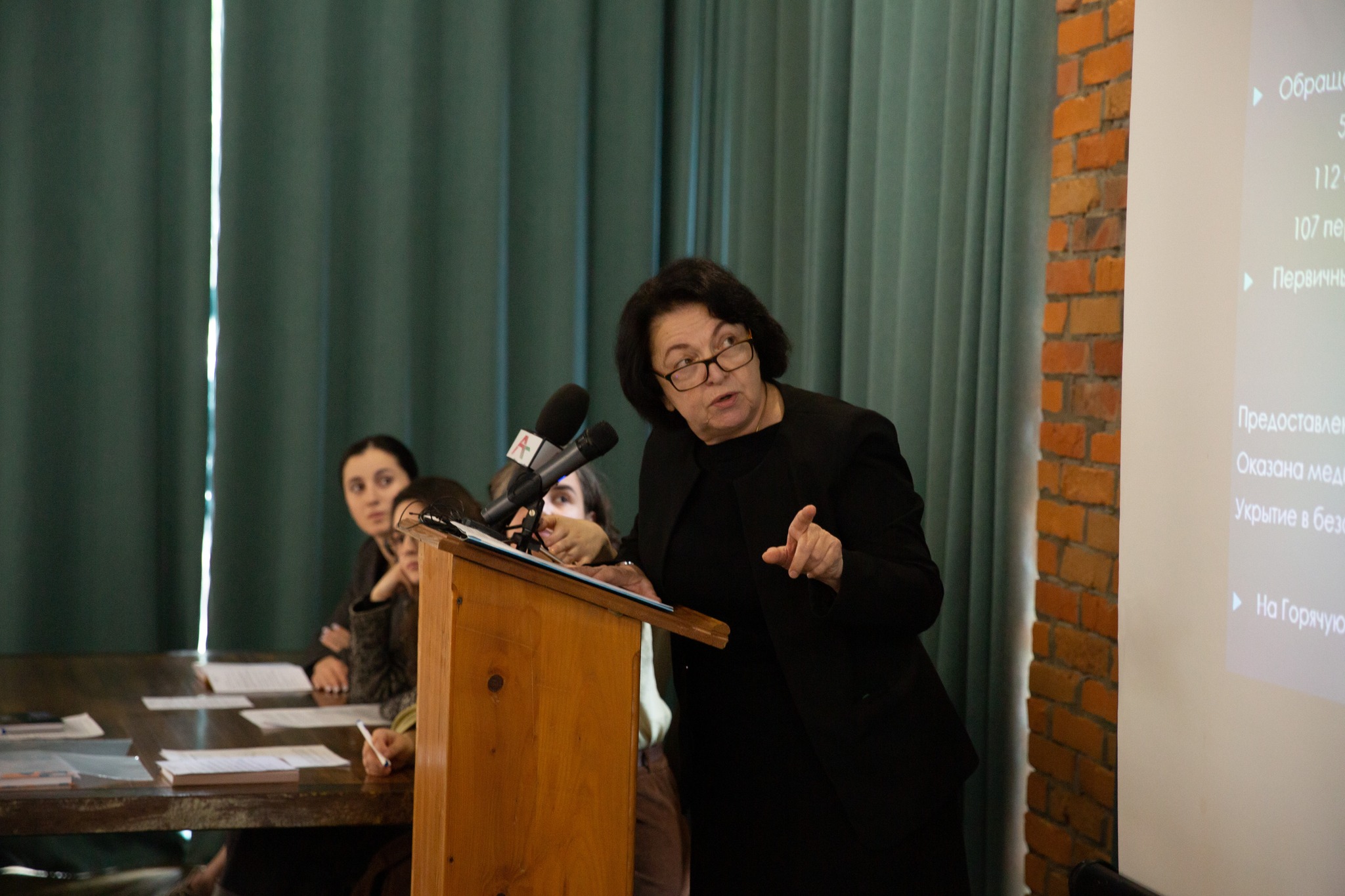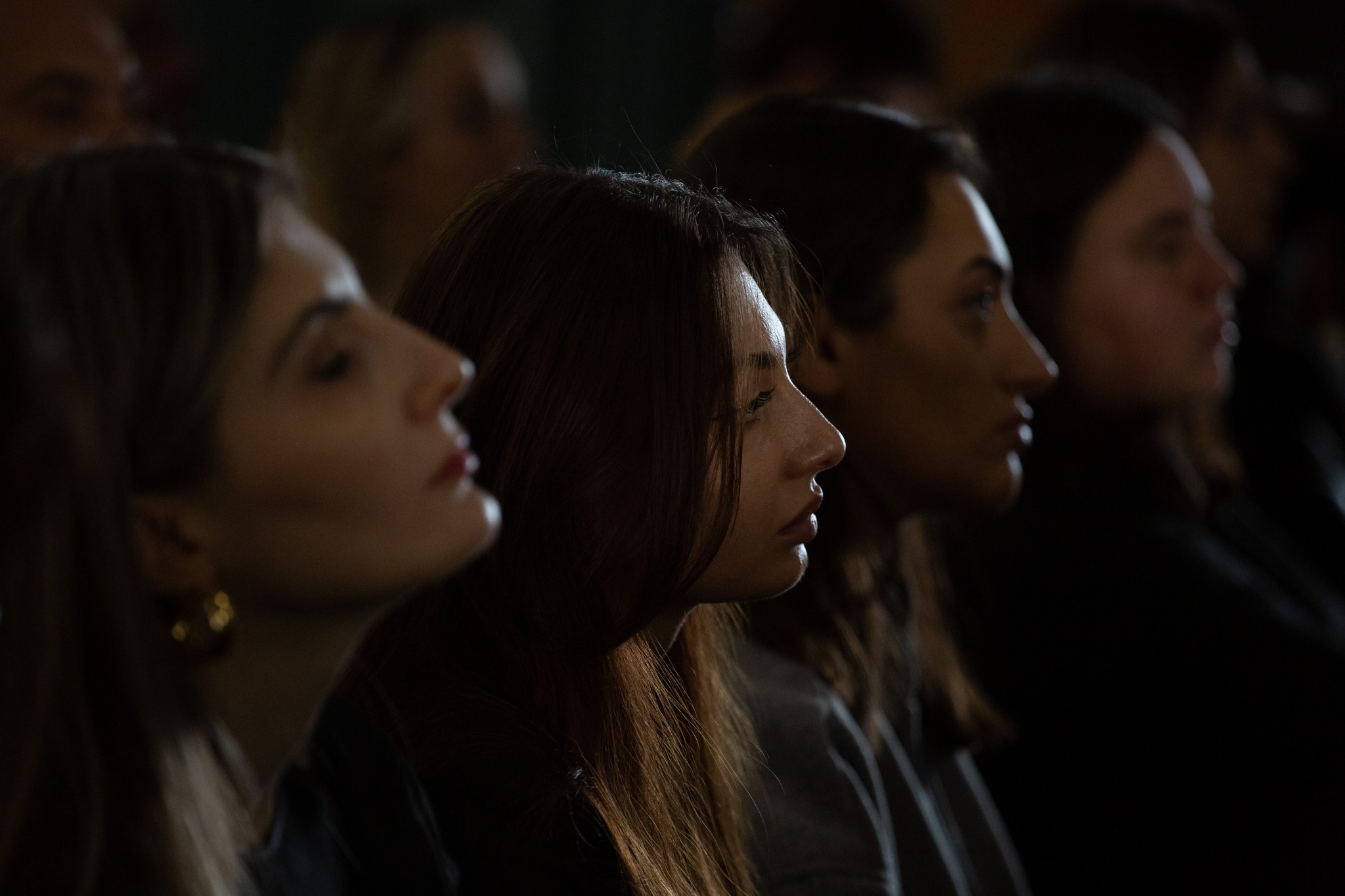Women's Rights in Abkhazia Discussed at Women's Forum

Women's Forum hosted by 'Asarkia' Foundation on 15 December, dedicated to women and children's safety
SUKHUM / AQW'A ― The charitable foundation "Asarkia" hosted a Women's Forum on Friday, 15 December, focusing on the safety of women and children.
Rozita German, the head of the "Asarkia" foundation, in her opening remarks, highlighted the increasing incidents of violence against women and children, including those with disabilities. She pointed out the difficulty in preventing and identifying such episodes due to the lack of appropriate legal mechanisms, expressing hope for a gradual resolution to this issue.
Marietta Topchyan, leader of the "Association of Women of Abkhazia," discussed the work of crisis centres in the region, currently numbering four. These centres offer women free and anonymous access to legal consultation and medical assistance.
Topchyan noted that the situation with domestic violence is exacerbated by a prevalent misconception in modern Abkhazian society that acts of violence against women and children are rare. “This is not the case,” she said. “Domestic violence is widespread in the republic, but victims rarely seek help and sometimes even feel guilty.”
She also mentioned the profoundly negative impact of violence on children, whose psyches are completely unprotected from such actions.

© Fond Asarkia Facebook page
The situation is worsened by the lack of statistical data, absence of victim protection mechanisms, the state's failure to consider counteracting violence as a critical task, and existing legislation not accounting for the nuances of domestic violence. “Without state participation, this problem cannot be solved,” she believes.
Lawyer Maya Shirokova, in her report on the law "On Ensuring Equal Rights and Opportunities for Men and Women in Abkhazia," asserted that the law is ineffective. She said many perceive the issue of domestic violence as contrived and a whim of a small part of society.
Shirokova observed that the state does not address this issue, gender statistics are not maintained, and women are significantly underrepresented in the Government, Parliament, and local self-government bodies. She suggested introducing quotas as one of the first steps to give women a minimal chance to compete with men.
Moreover, Shirokova noted that legislation puts men and women in different positions. State guarantees for women, considering their social role and biological characteristics, are not discrimination against men. However, the legislation is very lenient towards men, for instance, in matters of regular alimony payments, directly affecting the financial position of women with children post-divorce.

© Fond Asarkia Facebook page
Alica Pachaliya, head of the public organization "Amch," in her report on the abortion ban, highlighted that this policy has not led to an increase in birth rates. She stressed that the authorities approached demographic problems quantitatively rather than qualitatively, focusing on encouraging childbirth.
"It is essential to focus on creating conditions where women do not fear childbirth and child-rearing," Pachaliya asserted.
Lia Agrba, leader of the "Club of Public Affairs," believes some provisions prohibiting abortion need to be revisited. “There are medical indications where a child will die post-birth, and there are certain threats to the life and health of pregnant women. Due to the blunt denial of such indications, at least one woman has already died,” she stated.
Agrba added that the state should not harshly interfere in medical matters but rather focus on the country's economic development, creating conditions for increased birth rates, education, and assistance to women who have already given birth.
Lawyer Astan Khashig discussed several amendments to the "Healthcare Law" regarding abortion bans. He believes the ban should be lifted for social indicators up to 22 weeks of pregnancy and for medical indicators at any stage.
"Complete anonymity and rehabilitation post-abortion and the woman's voluntary consent are essential. At the same time, criminal liability can be introduced for abortions after 22 weeks in the absence of social indicators," he said.
Asida Lomia, head of the "Children's Fund of Abkhazia," is convinced that if a child witnesses violence at home, it is highly likely to become part of their adult life.
"Crisis centres exist, but they are insufficient and geared towards relatively older people. In a manual mode, we try to find temporary housing for every child in need of protection, but this is not enough," she noted.
Kama Argun, head of the public charitable organisation "Panorama," added that the consequences of violence against children are severe. As they grow older, they are five times more likely to become drug addicts and commit suicide. The state must ensure the protection of such children.
"It is necessary to create a unified system of guardianship in the country, ensure coordinated work between state bodies and public organisations, and crucially adapt international experience to Abkhazian realities," she emphasised.

© Fond Asarkia Facebook page
Lana Chkadua, head of the "Women's Development Fund" in Gali, pointed out that the concept of violence should not be limited to physical impact alone. For instance, financial enslavement of women exists. Employment and assistance in starting their businesses can give women confidence and help reduce the level of violence.
Said Gezerdava, a lawyer from the Centre for Humanitarian Programs, presented the draft law "On Domestic Violence." He noted that the initiative to develop the project belongs solely to public organisations.
"Unfortunately, the authorities avoid participating in this process, and officials are not interested in promoting the bill. They refer to the existence of the Family Code, which they believe covers everything," he lamented.
Gezerdava stressed that the Family Code is insufficient, and it is necessary to emphasize specifically domestic violence. The current legislation lacks a clear definition of "child rights abuse" and mechanisms for protecting victims. Existing norms allow avoiding responsibility. For example, doctors are not required to inform the internal affairs bodies when a person arrives with minor injuries.
He believes it is crucial for the law to define the types of domestic violence, which can be physical, psychological, sexual, and economic, and to legally assess the concept of "stalking," which women and children often encounter.
Following the speakers' reports, participants of the Women's Forum "The Current Situation with Women's Rights in the Republic of Abkhazia" addressed the deputies of the VII convocation Parliament. In their appeal, they stated:
"Recognising the danger of further ignoring the existing problem and the need for interaction between civil society and state institutions, including the police, healthcare system, Human and Child Rights Commissioners, journalists, and all concerned citizens, we call on the deputies to:
- Adopt the law 'On Protection from Domestic Violence';
- Make amendments to the 'Healthcare Law' regarding the permission of abortion based on medical and social indicators;
- Assist in creating new and strengthening existing mechanisms to prevent violence against women and children."
This forum represents a significant step in bringing attention and fostering collaborative efforts towards addressing the pressing issues of women's safety and rights in Abkhazia, emphasising the urgent need for legislative and social change.